宾语从句用法详解复习课程
- 格式:doc
- 大小:63.50 KB
- 文档页数:11
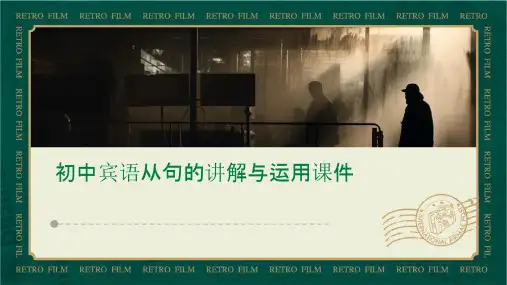
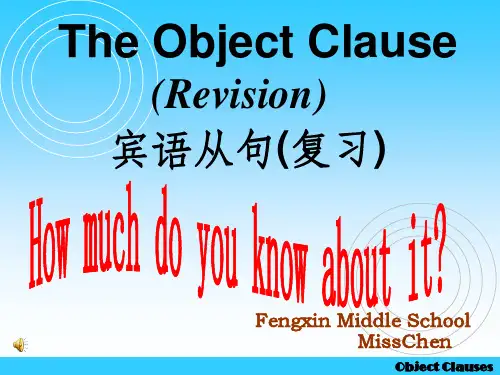

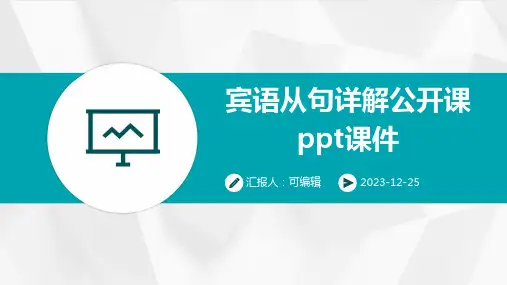



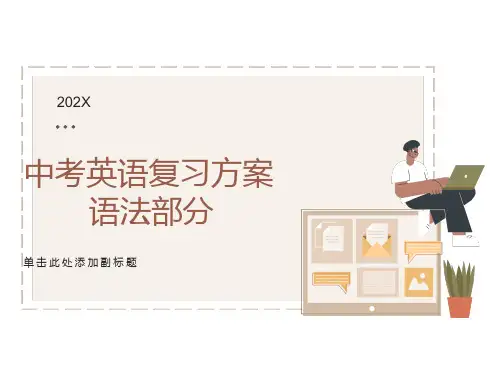


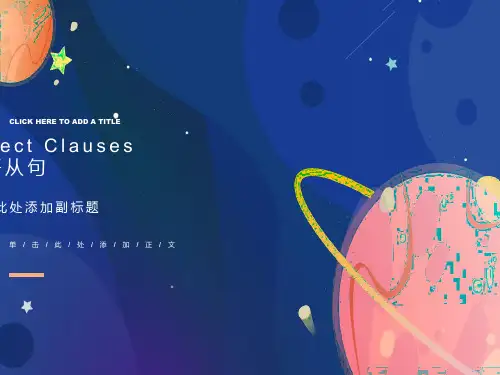
宾语从句讲义把握三要素: 连接词、时态和语序1.宾语是什么?宾语表示及物动词的对象或结果,回答做的是“什么”。
通常由名词或代词担任。
如: He canspell the word.(他能拼这个词)宾语的位置有哪些?1)动词后.....H.like.dogs.2)介词后面 例间接宾语后3.什么是直接宾语, 什么是间接宾语?有些及物动词带有两个宾语,一个指物,一个指人。
指物的叫直接宾语,指人的叫间接宾语。
间接宾语一般放在直接宾语的前面。
如:H.wrot.m..lette..(他给我写了一封信)(间接)(直接)有时可把介词to 或for 加在间接宾语前构成短语,放在直接宾语后面,来强调间接宾语。
如: H.wrot..lette.t.m..(他给我写了一封信)4.什么是宾语从句?宾语从句: 在句子中作及物动词或介词的宾语。
①基本形式:(主句+)连词+从句主语+从句谓语+... (不是疑问句语序)7.宾语从句的时态怎么处理?8.主句是一般现在时, 从句根据实际情况使用任何时态。
例句: Th.headmaste.hope.everythin.goe.well...thin..wil.d.bette.i.Englis.thi.term.9.主句是过去时态, 从句须用过去时态的某种形式。
例句:Sh.wa.sorr.tha.sh.hadn’.finishe.he.wor.o.time.10.当宾语从句表示的是一个客观真理或者事实时,即使主句是过去时,从句也用一般现在时态。
例句:Th.teache.tol.hi.clas.tha.ligh.travel.faste.tha.sound.宾语从句的语序是怎么样的?宾语从句的语序是陈述句语序即: 连接代词/副词+主语+谓语+其他成分。
.don’.kno.wha.the.ar.lookin.for. Coul.yo.tel.m.whe.th.trai.wil.leave?补充知识:8.哪些下情况中that不能省略?1.当句中的动词后接多于两个由that引导的宾语从句时, 第一个that可省, 但后面的that不可省。
《宾语从句》ppt课件完整版contents •宾语从句基本概念与结构•宾语从句中引导词用法•宾语从句时态与语序规则•宾语从句在复合句中应用举例•宾语从句与相似句型辨析•宾语从句常见错误及纠正方法目录宾语从句基本概念与结构定义及作用定义作用结构组成引导宾语从句的词,如that、whether、if等。
宾语从句中的主语,可以是名词、代词等。
宾语从句中的谓语,表示主语的动作或状态。
宾语从句中的宾语,可以是名词、代词等。
引导词主语谓语宾语分类与特点分类特点宾语从句具有完整的句子结构,可以独立成句;引导词在从句中不充当成分,无实际意义;宾语从句的语序一般为陈述句语序。
宾语从句中引导词用法引导陈述句thatwhether/ifwhether/if特殊疑问词+to do特殊疑问词引导特殊疑问句作为宾语从句,需根据句意选择合适的特殊疑问词,如what、where、when、why、how等。
如:Can you tell me how to get to the station? 你能告诉我怎么去车站吗?whether/if在极少数情况下,whether/if也可引导特殊疑问句作为宾语从句,但通常只用于表示选择或对比的语境中。
如:I'm wondering whether/if we should go by car or by train. 我在考虑我们是开车去还是坐火车去。
宾语从句时态与语序规则010204时态呼应规则主句为一般现在时,从句可为任意时态。
主句为过去时,从句为过去的某一时态。
主句为过去进行时,从句应用过去进行时或一般过去时。
主句为将来时或含有情态动词时,从句时态根据实际情况而定。
03语序调整原则注意事项及常见错误01020304宾语从句在复合句中应用举例并列连词连接两个宾语从句,如I don't know whether he will come or not. 我不知道他是否会来。
宾语从句用法详解宾语从句用法详解(例句丰富)一、宾语从句的引导词宾语从句通常由连词that和whether (if)、连接代词或连接副词以及关系代词型what引导:1. that引导We believe that he is honest. 我们相信他是诚实的。
The doctor insists that I give up smoking医生坚持要我戒烟。
I suggest that we should go tomorrow. 我建议我们明天走。
I suggested that we should go the next day. 我建议我们第二天走。
We learnt from his letter that he was in Spain. 从他的信里我们了解到他在西班牙。
The seller demanded that payment should be made within five days. 卖方要求5日内付款。
2. whether / if引导I don’t know whether he’ll arrive in time. 我不知道他是否能及时到。
I didn’t know whether they liked the place. 我不知道他们是否喜欢这个地方。
I’ll see whether I can induce him to accept it. 我要看看我是否能劝他接受。
I asked her whether she agreed. 我问她是否同意。
He enquired if her parents spoke Spanish. 他问她父母是否讲西班牙语。
I wonder if it’s large enough. 我不知道它是否够大。
She didn’t say if he was still alive. 她没说他是否还活着。
3. 连接代词引导I don’t know who [whom] you mean. 我不知道你指谁。
Please tell me which you like. 告诉我你喜欢哪一个。
I’Il do whatever I can do. 我将做我所能做的事。
You can take whichever you like. 你爱拿哪个就拿哪个吧。
We’ll do whatever we c an to save him. 我们将尽我们所能来挽救他。
Take whichever seat you like. 你要坐哪个座就坐哪个座位。
Give it to whoever you like. 你把它爱给谁就给谁。
You don’t know what you are talking about. 你在说什么,你自己也不知道。
Tomorrow at this time we’ll know who is elected. 明天这时候我们就会知道谁当选了。
4. 连接副词引导He asked why he had to go alone. 他问他为什么必须一个人去。
You don’t know when you are lucky. 你身在福中不知福。
I asked how he was getting on. 我问他情况怎样。
He knows where they live. 他知道他们住哪里。
Have you found out how wide the ditch Was? 你了解到那条沟有多宽吗?I’d like to know when they will let him out. 我很想知道他们什么时候会放他出来。
We didn’t know why he had answered in that fashion. 我们不明白他为什么这样回答。
3. 关系代词what引导She has got what she wanted. 她要的东西得到了。
I want to tell you what I hear. 我想把听到的情况告诉你。
He could not express what he felt. 他无法表达内心的感受。
They did what they could to console her. 他们尽量安慰她。
They thought they could do what they liked with him. 他们以为他们可以对他为所欲为。
【注意】有时介词后可接一个宾语从句(但介词后通常不接that和if引导的宾语从句):From what you say, he is right. 根据你所说的,他是对的。
有极个别介词(如but, except)可接that引导的宾语从句:She remembered nothing about him except that his hair was black. 她对他什么都不记得,只记得他的头发是黑的。
比较下面两句用what引导的宾语从句,它们的意思不一样:He began to think about what he should do. 他开始考虑应当怎样做。
二、宾语从句与形式宾语it当宾语从句后跟有宾语补足语时,通常在宾语从句处使用形式宾语it,而将真正的宾语从句移至句末:I think it best that you should stay here. 我认为你最好住这儿。
He hasn’t made it known when he is going to get married. 他还没宣布他何时结婚。
She found it difficult to answer the question. 她发现回答这个问题很困难。
He feels it his duty to hetp others. 他认为帮助别人是他的责任。
He thought it best to be on his guard. 他认为他最好还是要警惕。
He made it a rule to speak in Parliament at least once every session. 他规定自己在议会每次开会时至少发一次言。
I find it interesting talking go you. 我觉得同你谈话很有意思。
I consider it wrong to cheat in an examination. 我认为考试作弊是不对的。
三、连词that的省略问题引导宾语从句的连词that 通常可以省略:She said (that) she would come to the meeting. 她说过要来开会的。
I promise you (that) I will be there. 我答应你我会去。
I hoped (that) I would / should succeed. 我曾希望我会成功。
He thinks (that) they will give him a visa. 他想他们会给他签证。
He thought (that) they would give him 3 visa. 他本想他们会给他签证。
I expect (that) the plane will he diverted. 我料想飞机会改变航线。
I expected (that) the plane would be diverted. 我本料想飞机会改变航线。
Everybody knows (that) money doesn’t grow on trees. 众所周知,金钱是不会从树上长出来的。
I suggested (that) they should / shouldn’t drive along the coast. 我建议他们沿着 / 不要沿着海岸开车。
【注】有时为了强调,that引导的宾语从句可位于句首,此时that不可省略:That she is a good girl I know. 她是一个好姑娘,我是知道的。
四、宾语从句与否定转移当动词think, believe, suppose, expect, imagine 后接一个表示否定意义的宾语从句时,其否定通常转移到主语:I don’t suppose that it is true. 我认为那不是真的。
I don’t imagine that he will come. 我想他不会来的。
(from )I don’t think we need waste much time on it. 我想我们不必在这上面花太多时间We didn’t think we’d be this late. 我们没想到我们会到得这么晚。
I don’t suppose I’ll trouble you again. 我想我不要再麻烦你了。
•宾语从句讲解及其练习题(附答案)12一,引导词A,由that 引导的陈述句性的宾语从句,在很多动词如say, think, wish , hope, see, believe, agree, expect, hear , feel等动词后。
连词that只起连接作用,在从句中不做句子的成分,也无词汇意义,在口语中常被省略,但在大多数情况下还是以不省为好,特别是在笔语中。
例:I told him that he was wrong.l在think,believe, suppose, expect等动词引起的宾语从句中,有时谓语尽管是否定意义,却不用否定形式,而将think 等动词变为否定形式。
例:I don’t think you are right. (我认为你做的不对)l在许多带有复合宾语的句子中,that引导的宾语从句经常移到句子的后面,而用it做形式宾语。
例:We think it wrong that he told a lie to everyone (我认为他向每一个人撒谎是错误的)B,由连词if、 whether 引导的表示“是否…”的宾语从句。
Whether,if 在从句中不做句子的成分,一般情况下,whether和if 可以替换。
例:I don’t know if/whether he will come tomorrow.The teacher asked if/whether we had finished the experiment.l在介词后面的宾语从句中不用if引导例:Everything depends on whether we have enough money。
l宾语从句中有or not时不用if引导.例:I don’t know whether the movie star will come or not.l和不定式连用作宾语时不用if引导.例:Whether to go there or not hasn’t been decided.C,由wh-引导的宾语从句。